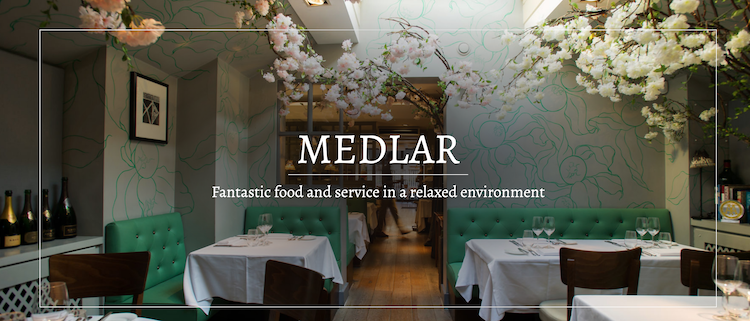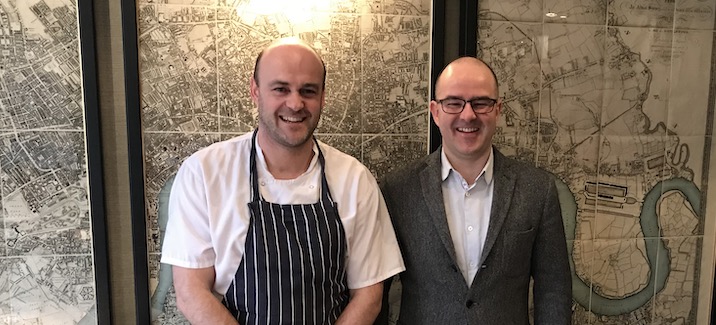
Fine Dining Guide had the pleasure of interviewing David O’Connor (right) and Joe Mercer Nairne (left), who in April 2021 will be celebrating 10 years as the proud owners of the restaurant at 438 King’s Road, Chelsea. The partnership that gave birth to Medlar Restaurant was the coming together of two fine exponents of their trade from the Nigel Platts-Martin group of restaurants: David, with a calm authority and unassuming charm in front of house and Joe a rising star in the kitchen at Chez Bruce. They both found time to sit down and discuss their journey with Daniel Darwood in an interview that took place during late February 2020 at Medlar Restaurant.
How did David come to open Medlar with Joe?
David always imagined running his own restaurant but envisioned his home of the Wirral. His parents had owned a restaurant in Heswall so he was steeped in the trade. His career, however, took a turn to London. David met the then sous chef, Joe Mercer Nairne, at Chez Bruce in Wandsworth Common. They hit it off straight away and shared the same ambition, so it was only natural that they should join forces. The search for a site took in Turnham Green and Farringdon, where they faced competitive bids from wealthy chains, before settling on The King’s Road. The chosen site had the benefit of proximity to Sloane Square, along with a history of longevity of businesses on and around the site. David and Joe could also move forward with financial independence which would free up their decision making going forward.
Who have proven your greatest mentor(s) and what have they taught you?
David’s early front of house training came at a privately-owned hotel, managed by his brother. His career would gather significant pace under Patrick Fischnaller, General Manager at Orrery in Marylebone High Street. The ambition of the restaurant combined with the level of intensity of service meant he learned so much so quickly – concentration, speed of thought, technical service skills – high standards at all times were demanded, which stretched him to the limit. Indeed, such was the success of this training that each of the front of house team subsequently opened their own businesses!
At the two Michelin starred The Square restaurant, which itself was delivering relentlessly high standards, David was hired as a chef de rang. Restaurant manager Jacques Carlino taught him the art of creating regulars from customers. In an almost exclusively French Front of House team, “the English Waiter” was trusted to engage in discussion with the well-heeled clientele. David feels that perhaps his biggest gratitude has been owed to Bruce Poole and Nigel Platts Martin, the owners who nurtured his potential by providing his first management role at a sister restaurant in the group, Michelin starred Chez Bruce. Having proven himself in every way, several years later, the vacancy came up to go back to The Square as restaurant manager, David took the opportunity with both hands. Always learning on the job, as well as dedicating his otherwise leisure time, David’s management skills continued to blossom over twelve years with the group, establishing him as a national leader in his field. The natural next step was his own business.
For Joe, places he liked to eat would be places where he wanted to work. He enjoyed his time as sous chef with Bruce Poole at Chez Bruce and also travelled to Australia where he worked with Neil Perry at Rockpool in Sydney. Experience at Gordon Ramsay’s Savoy Grill proved the hardest place to work, engendering a solid discipline and work ethic, something he has subsequently felt confident to ask of others. He laments these traits are lacking amongst many of the current generation of chefs, who look for the easiest route to success without undergoing the often repetitive work that each section requires.
What is the structure of the brigade at Medlar?
David and long standing assistant Voula oversee the front of house team, managing reception, taking orders and ensuring guests are comfortable and happy. Waiters are allocated tables in two or three sections. Sommeliers are given scope either to converse knowledgeably with wine connoisseurs or to address more modest requests. The unsung heroes are the runners who bring food from the basement kitchen, drinks and coffee from the first floor bar, and collect wine from fourth floor wine cellar.
In the kitchen there are five sections with one chef on each. The chefs move around each section as required. There are 10 chefs on a rota with a natural turnover. Happily, Joe’s two sous chefs have been with him since opening, ensuring high quality and consistency of the finished product.
[Medlar Sample Menu March 2020]
What would you say makes great service from the front of house?
David is uncompromising in his pursuit of friendly, professional, welcoming, attentive and unobtrusive service. Staff are trusted to enhance the guest experience by improvisation through to reading the customer’s preferences. The flexibility afforded to the staff avoids a stilted, formulaic approach. Essentially David’s mantra is to get the basics absolutely right and the magic dust of customer interaction will add value naturally.
What proportion of your clientele are locals and regulars?
At least 75% are locals and regulars at most services, something which makes David and Joe proud but not complacent. They agree that the essential pre-requisite for repeat custom is consistent delivery of high quality food and service, a complete hospitality package.
What is your view of Trip Advisor?
The biggest compliment customers can pay after an enjoyable meal is to post an online review. Trip Advisor is used to access feedback and reviews, which are mostly positive, rather than a means to interact with customers. Negative reviews are investigated internally as far as possible. Experience suggests that 90% of mistakes usually occur if the service team fail to recognize a potential issue, which when continuing unnoticed, may fester and lead to repetition or escalation of the issue. To fix any potential challenges, positive action by a competent and perceptive front of house will prevent any further escalation and resolve them immediately – essential with the more demanding customers.
Joe, what inspired you to become a chef?
Joe’s curiosity about food, born of enjoyment but with no cooking skills to match, resulted in two terms at Leith’s Cookery School and a kitchen job after he graduated from Oxford. Although not a chef junkie, he enjoyed watching repeat series of Keith Floyd and Rick Stein, which combined travel with cookery.
Where have you worked and what did you learn along the way?
Joe enjoyed the chef lifestyle, if not the type of cooking, in his first position at Carluccio’s – then a much smaller operation – which inspired him to continue with a career with a focus in high end restaurants. Joe enjoyed the classical training of the Savoy Grill, and whilst the hours were long and punishing, it instilled a belief in everyone there that they could cope with just about anything. The structure was similar at Savoy, Chez Bruce and Rockpool. Perhaps the Savoy was slightly more hierarchical, but he enjoyed working at all of them. All three of the kitchens instilled great discipline and work ethic: Something which younger chefs today seem as if they would like to do without.
How would you describe your cuisine style and how often does the menu change?
Joe’s style is based on the core principles of French brasserie cooking, elevated and refined with his own spin. Joe enjoys eating at the great Parisian brasseries where the cooking of classic dishes such as duck confit is irreproachable. Menus at Medlar reflect the seasons, although signature dishes remain throughout the year. There are occasional international influences, the Asian ones being learnt at Rockpool in Sydney. True to his love of offal, Joe sometimes offers lamb tongues or sweetbreads, despite their increasing cost and difficulty in sourcing.
Describe three of your signature dishes and explain why they have been particularly successful
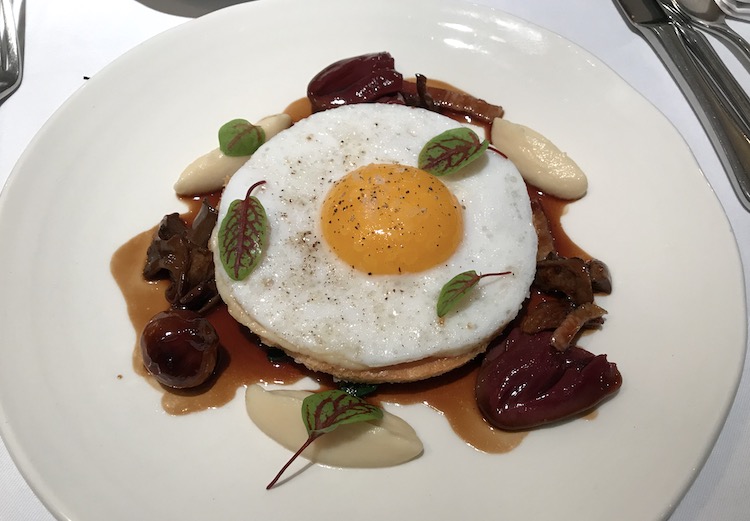
Duck egg tart is, for Joe, his most prized dish, which had been evolving since his Chez Bruce days. It is a take on the brasserie staple oeufs en murette. Fried duck eggs replace poached hen’s eggs, a crisp pastry base substitutes for fried crutons, turnip puree and sautéed duck hearts are innovations, whilst meaty lardons and a deeply flavoured red wine sauce remain.
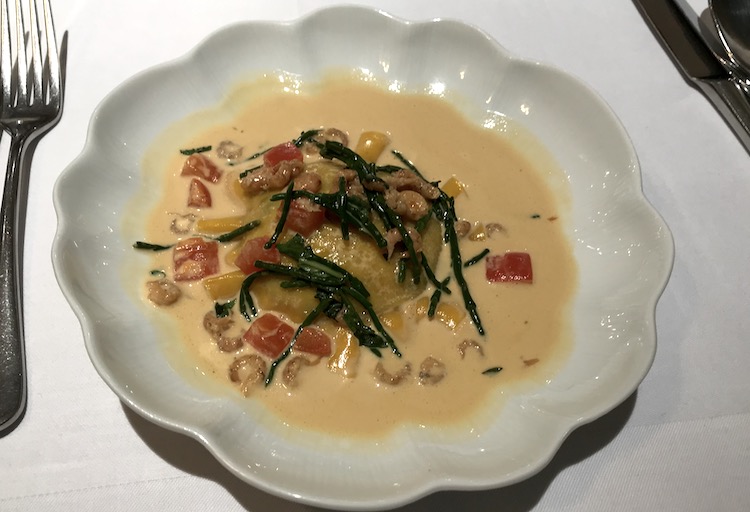
Crab raviolo which was only meant to stay on the menu temporarily, given there were many similar dishes available elsewhere, has proved a winner, accounting for at least 50% of the starters ordered. The silky pasta is generously filled with white crab meat, the brown meat incorporated in the rich bisque. Dressed with samphire, brown shrimps, and a fondue of leeks, this labour-intensive dish, not easily made at home, remains a popular favourite.
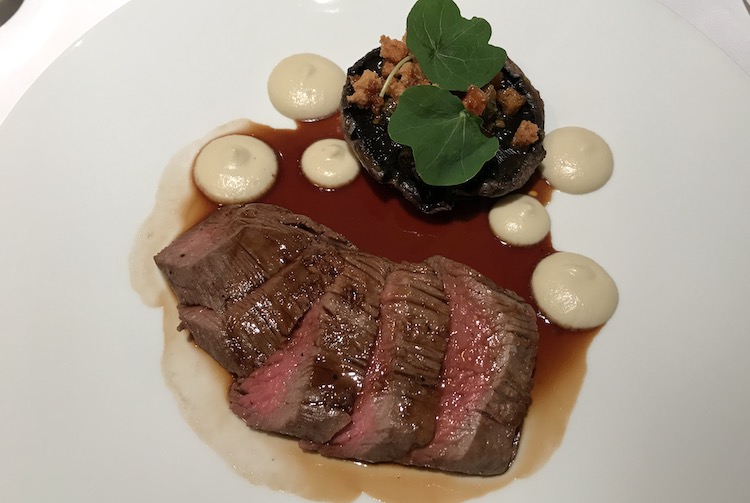
Rump or under blade of Belted Galloway, served at dinner or lunch respectively, is another popular main course. Under blade in particular is a reasonably priced, difficult to source cut favoured by the kitchen. Cooked medium rare for full flavour, and served with café de Paris snails, stuffed portobello mushroom, shallot puree, a rich jus and bearnaise sauce, it is served with a side of lightly dressed frisee to give freshness. A composite dish in itself, most diners will order a side of triple cooked chips (enough for two) to complete the gastronomic experience.
How value for money is achieved?
Both David and Joe agree that if customers leave not hungry, fully satisfied with the food and service, then value for money has been achieved. This applies to all levels of restaurant – it is the quality of the experience not the amount on the bill which is relevant.
What are your plans for the future?
David will consider expansion – perhaps a coffee shop, pub or another restaurant – if the correct opportunity arises. He prefers London, but is not averse to country pub location. Joe who lives in Putney when working but whose family is based in Winchester, would prefer to expand within the capital, where he can keep his highly experienced team.
Overall David and Joe have forged a winning business partnership – Medlar restaurant is widely recognised in London as a reliably high quality, restaurant delivering first class hospitality in a relaxed atmosphere with the finest classical food. Long may it continue!




